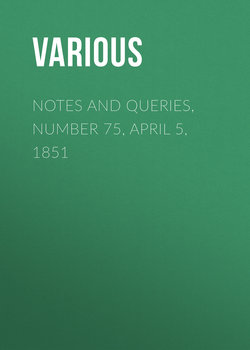Читать книгу Notes and Queries, Number 75, April 5, 1851 - Various - Страница 5
Minor Notes
ОглавлениеShakspeare's Venus and Adonis.—The following extract from an advertisement in the St. James's Chronicle, April 15, 1779, is worth a note as illustrative of the altered value of the book referred to:—
"If any person is possessed of an impression of Shakspeare's Venus and Adonis, 4to. Printed by Richard Field for John Harrison, 1593, and will bring it to Mr. Thomas Longman, bookseller, in Paternoster Row, he will receive one guinea for it."
Malone gave 25l. for the copy in his collection in the Bodleian.
J. F. M.
Moorfields in Charles II.'s Time.—I copy this from The New Help to Discourse, published about 1670:
"Two gentlemen of Stepney going homewards over Moor-fields, about twelve of the clock at night, were staid by an impertinent constable with many frivolous questions, more by half to show his office than his wit; one whereof was, If they were not afraid to go home at that time of the night? They answered, 'No.' 'Well,' said he, 'I shall let you pass at this time; but if you should be knockt on the lead before you get home, you cannot but report that there was a good watch kept in Moor-fields."
Blowen.
Yankee, Derivation of.—The word Yankee is nothing more than the word English so transformed by the imperfect pronunciation of the natives of Massachusets—Yenghis, Yanghis, Yankies. The orthography of this much-used epithet, which is not given, we believe, in any English or American work, was communicated to M. Philarète Charles by one of the best-informed men of that province.
"Le mot Yankee, appliqué aujourd'hui comme sobriquet aux populations agricoles et commerçantes du nord, n'est autre que le mot English transformé par la prononciation défectueuse des indigènes du Massachusets: Yenghis, Yanghis, Yankies. Nous tenons de l'un des hommes les plus instruit de la province cette curieuse étymologie, que ne donne aucun ouvrage americain ou anglais. Les Anglais, quand ils se moquent des Yankies, se moquent d'eux-mèmes."—Philarète Charles, "Les Americains," in Revue des Deux Mondes, May 15, 1850.
J. M.
A Word to Literary Men (Vol. iii., p. 161.).—Perhaps Mr. Kenneth R. H. Mackenzie will allow me to add the following as a rider to his suggestion:—
"Even after all the labours of the Prussian scholars," says Dr. Arnold, "much remains to be done towards obtaining a complete knowledge of the number, and still more of the value, of the Greek MSS. now existing in Europe. It is not easy to know how many MSS. of any given writer are extant, where they are to be found, and, above all, whether from their age and character they are worth the trouble of an exact collation. A labour of this kind cannot be accomplished by individuals; but the present spirit of liberal co-operation, which seems to influence literary as well as scientific men throughout Europe, renders its accomplishment by the combined exertions of the scholars of different countries by no meals impracticable. It would be exceedingly convenient to possess an alphabetical list of all the extant Greek and Latin writers, with a catalogue raisonnée of the MSS. of each; and if such a work were attempted, there is little doubt, I imagine, that in point of number a very large addition would be made to the stock of MSS. already known. What the result might be in point of value is another question; still it is desirable to know what we have to trust to; and when we have obtained a right estimate of our existing resources in manuscripts, we shall then be better able to judge what modern criticism will have to do from its own means towards bringing the text of the ancient writers to the greatest possible state of perfection."—Preface to Thucydides
